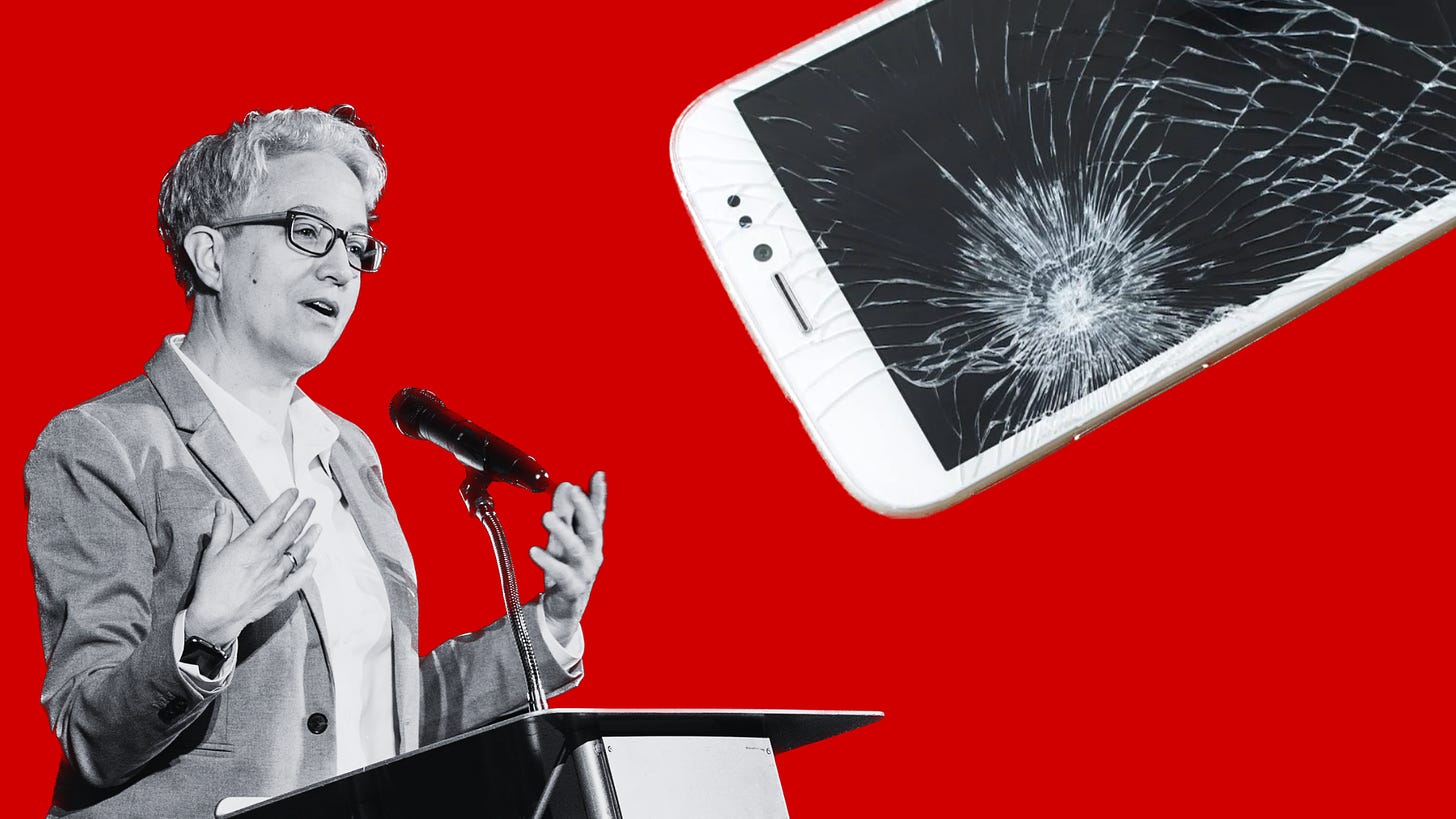Oregon Legislature Sends Right To Repair Bill To Governor’s Desk
The Oregon House of Representatives approved Senate Bill 1596 sending the nation’s strongest right to repair law to Governor Tina Kotek to sign into law. Also: a Danish city reimagines re-use.
The nation’s strongest right to repair legislation passed through Oregon’s legislature on Monday and is on its way to the desk of Governor Tina Kotek for a signature.
Oregon Right to Repair Act (Senate Bill 1596) passed the House of Representatives with a bipartisan 42 to 13 margin on Monday after passing through the state Senate on Feb. 20 by a vote of 25 to 5. Governor Kotek has five days after receiving the bill to sign it into law.
The law extends its reach to "digital electronic equipment," covering a vast array of devices.
It mandates that manufacturers provide independent repair shops and consumers with the same diagnostic tools, parts, and information available to their authorized repair outlets, a move that is essential for enabling independent repairs to be carried out effectively. Furthermore, it bars manufacturers from implementing software or design features that hinder the independent repair of these devices, albeit with certain exceptions for everyone’s favorite safety and security concerns.
“By eliminating manufacturer restrictions, the Right to Repair will make it easier for Oregonians to keep their personal electronics running. That will conserve precious natural resources and prevent waste. It’s a refreshing alternative to a ‘throwaway’ system that treats everything as disposable,” said Charlie Fisher, OSPIRG state director, in a statement.
A strike against abusive parts pairing
Most notably, the Oregon bill has the strongest prohibitions yet on the use of “parts pairing,” in which manufacturers (here’s looking at you, Apple!) use digital rights management technology to link specific parts to device hardware. Pairing is explained by manufacturers as a tool for preventing the use of counterfeit parts. Practically, however, it puts the manufacturer in the position of having to approve even simple repairs, like using an intact screen from one iPhone 13 to replace a shattered screen on another iPhone 13. The practice has garnered increasing attention as an obstacle to repair, with the French government investigating whether parts pairing constituted a deceptive business practice.
The language of the bill prohibits the use of parts pairing to “prevent or inhibit an independent repair provider or an owner from installing or enabling the function of an otherwise functional part.” It also prohibits manufacturers from “reduc(ing) the functionality or performance of” a device, or to “display misleading alerts or warnings, which the owner cannot immediately dismiss, about unidentified parts.”
That language is targeted right at companies like Apple that might allow aftermarket or swapped parts on their devices, but ‘punish’ device owners with nagging messages about being unable to “verify” the part, or with diminished or disabled features.
The bill was lauded by leaders of the right to repair movement, including Kyle Wiens, co-founder of iFixit (and an Oregon native):
“I’m beyond proud of my home state for passing the strongest-yet electronics Right to Repair bill. By applying to most products made after 2015, this law will open up repair for the things Oregonians need to get fixed right now. And by limiting the repair-restricting practices of parts pairing, it protects fixing for years to come. We won’t stop fighting until everyone, everywhere has these rights.”
The big picture
All said, this law is not perfect—it doesn’t detail how long manufacturers must provide support and contains very significant product exclusions. There are exclusions for certain categories of products including medical devices and “certain electronics.”
And while it includes a laudable clause that manufacturers will be required to "consider the repairability of the covered device during the design process" there is no a clear enforcement mechanism by which manufacturers could be held to that vague standard. This makes the portion of the law likely inconsequential and more talk than walk.
But let’s not allow perfect to be the enemy of the (wicked) good. Not only is this law a significant advancement in consumer rights, it would become the nation’s strongest right to repair law in the nation. If won, it would be legislative victory set against the backdrop of victories in years past, and could serve as a potential blueprint for future state (and even national) legislation.
Other News
The Danish city of Aarhus reimagines re-use. Every morning, about 50 to 100 people gather in line in front of a center owned by the municipality of Aarhus, the second-largest city in Denmark, where they can give — and take — all sorts of materials for free. More than two metric tons of objects pass through the center per day. Aarhus is committed to a circular economy, with plans to establish multiple material exchange centers across the city. The goal is to make the initiative more local and circular, minimizing the need for transportation of goods between centers. At a higher level, Danes' willingness to recycle and trust in government contribute to the success of such initiatives.
Colorado legislature looks to expand right to repair to electronics.
Colorado’s House of Representatives is pushing a major expansion of that state’s right to repair laws to include electronics. Legislation sponsored by Rep. Brianna Titone and Rep. Steven Woodrow that would challenge manufacturers to make devices more repairable, countering forced obsolescence. In a hearing of the House Business Affairs and Labor Committee on February 29th, critics, including Repair Done Right Coalition and TechNet, raised concerns about consumer safety and data privacy. Proponents countered that independent repair shops often provide better service and the bill could promote sustainable consumer practices. In the end, the bill passed through the committee by a vote of 8-3.
Lenovo collaborates with iFixit to enhance the repairability and upgradability of its refreshed ThinkPads, aiming for sustainability with a design that uses recycled materials and features like socketed DIMM, easily replaceable SSDs and batteries, alongside new repair guides and a high repairability score from iFixit.
The US needs a new privacy law…now! Writing for the Electronic Frontier Foundation, Cory Doctorow is advocating a “privacy first” policy that would update U.S. laws to provide strong federal privacy protections in the USA. The last major consumer privacy law dates back to 1988. There is a pressing need for a comprehensive privacy law in America to address a myriad of issues including tech monopolies, competition, and user privacy, Doctorow argues. Updated privacy rights could also support Right to Repair laws, which face opposition from tech monopolies citing privacy risks. Balancing privacy and consumer choice is essential.
Apple’s Vision Pro appears to be its most unrepairable product yet, with intentional design hurdles making it extremely difficult for third-party repair shops or DIY enthusiasts to replace faulty hardware, including serialized parts and software-locked components.
Ireland unveils its new Waste Management Plan for a Circular Economy for 2024-2030, aiming to reduce waste by 300,000 tons, err… tonnes ;-) and promote recycling, repair, and reuse, signaling a significant step towards sustainability and environmental responsibility with broad public support.
Apple's extension of its Self Service Repair program to recent MacBook Pro and iMac M3 models allows users to conduct repairs themselves using certified parts, representing a shift towards consumer autonomy and the right to repair, despite criticisms regarding Apple's control over the repair process.
The FTC supports Colorado's proposed right-to-repair law, advocating for access to service information and affordable replacement parts for digital electronic equipment, challenging manufacturers' justifications for repair restrictions like parts pairing.
A recent report reveals that nearly two-thirds of ag. equiptment dealers encounter machines with altered emission systems, with over 10% seeing them regularly, prompting varied responses including refusal to work on such machines, attempts to educate customers on the risks, and policies for returning machines to factory settings or requiring liability agreements from customers.
Why can’t toasters last 30-years? Short-lived gadgets highlight the need for better access to repair services and spare parts, and author Susie Mesure while sharing her experience with keeping her trusty Dualit toaster running for over 30 years through repairs and visits to Repair Cafes.
Deere class action lawsuit faces delay over data. The right-to-repair lawsuit against John Deere faces a potential six-month delay due to ongoing data disputes. The plaintiffs, a group of farmers, seek structured data from Deere's EQUIP system regarding service information on machines. Farmers allege Deere monopolizes repair services via onboard central computers, violating antitrust laws. The plaintiffs have diligently pursued data requests since March 2023, facing delays from Deere's claims and proposals for extensions. The requested data is crucial for class certification, assessing damages, and proving antitrust claims. The plaintiffs' experts require at least six months to analyze the data once obtained.





